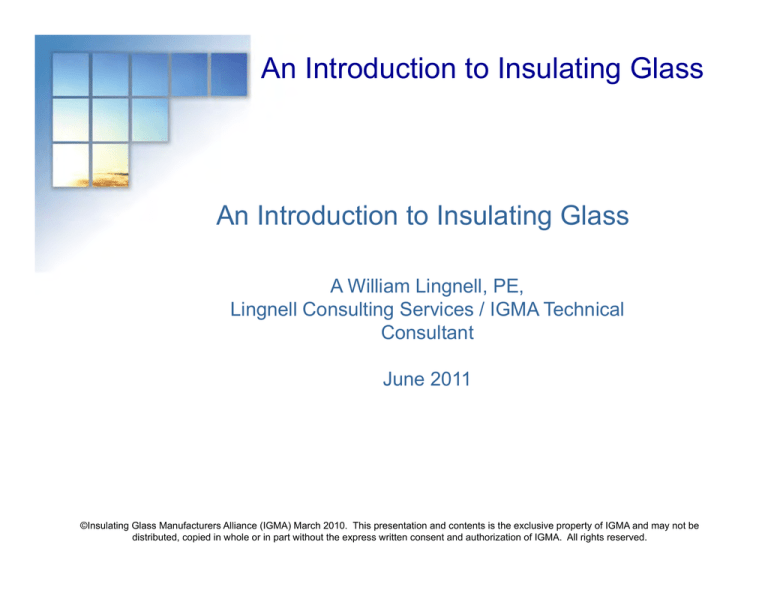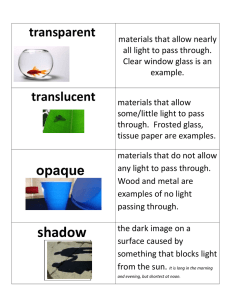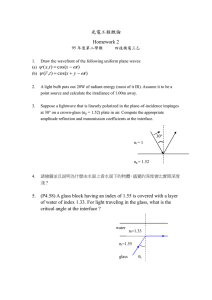
An Introduction to Insulating Glass
An Introduction to Insulating Glass
A William Lingnell, PE,
Lingnell Consulting Services / IGMA Technical
Consultant
June 2011
©Insulating Glass Manufacturers Alliance (IGMA) March 2010. This presentation and contents is the exclusive property of IGMA and may not be
distributed, copied in whole or in part without the express written consent and authorization of IGMA. All rights reserved.
An Introduction to Insulating Glass
L TOPICS TO COVER
L
L
L
L
L
L
History of Insulating Glass
What is an Insulating Glass Unit
Use and Types of Insulating Glass
Energy Concepts for Insulating Glass
Materials Used in Insulating Glass
Fabrication of Insulating Glass
An Introduction to Insulating Glass
L History of Insulating Glass
L Thomas D. Stetson, Inventor
L Received patent in 1865
L What did he do?
An Introduction to Insulating Glass
An Introduction to Insulating Glass
L What is an Insulating Glass Unit?
L Insulating Glass Units are sealed
combinations of 2 or more lites of glass
separated by a dry air space.
L And what do they do?
L Insulating Glass Units save energy, save
money, reduce pollution and greatly improve
the comfort inside a building.
An Introduction to Insulating Glass
Large Commercial Project Investigated
An Introduction to Insulating Glass
Seal Failure in Wood Window with True Divided Insulating Glass Lites
An Introduction to Insulating Glass
Outside
Inside
Schematic of an Insulating Glass Unit
An Introduction to Insulating Glass
USE AND TYPES OF INSULATING GLASS
GLASS TYPES
L
L
L
L
L
Clear Glass: soda lime, low iron
Tinted Glass: green, gray, bronze, blue, blue green
Reflective Glass: pyrolytic, sputtered
Low Emissivity Glass: pyrolytic, sputtered
Laminated Glass: monolithic, insulating, PVB interlayer,
ionoplast interlayer, urethane interlayer, silicone
interlayer, resin interlayer
L Patterned Glass: sand blasted, chemically etched, rough
rolled
An Introduction to Insulating Glass
GLASS TYPES
L Spandrel Glass: ceramic frit opacification, film
opacification, silicone opacification
L Hydrophilic Coated Glass: self cleaning, easy to clean
L Fire Rated Glasses
L Wired Glasses
L Electrochromic coatings
An Introduction to Insulating Glass
GLASS KINDS
L Annealed
L Heat Treated
– Heat-Strengthened
– Tempered
L Chemically-Strengthened
An Introduction to Insulating Glass
USE AND TYPES OF INSULATING GLASS
Insulating Glass Units are used in a variety of applications
including windows, doors and skylights for commercial
buildings and residential construction as well as in
refrigeration units, control towers, rail transportation, cars
and busses, marine applications and many other areas
where energy conservation and comfort are part of the
design.
An Introduction to Insulating Glass
Energy Concepts for Insulating Glass
Terminology
L U-factor (U-value) - The measure of the rate of non-solar
heat loss or gain through a window system in terms of Btu/
hr-sq ft·ºF (W/sq m·C) . The lower the U-factor the greater
the resistance to heat flow…..a better insulator.
L R-value - The measure of the resistance of a glazing
material or fenestration assembly to heat flow. Basically
the inverse of the U-factor or R = 1/U
L Solar Heat Gain Coefficient (SGHC) – The fraction of the
solar radiation admitted through a window or skylight both
transmitted and absorbed and released inward.
An Introduction to Insulating Glass
Energy Concepts for Insulating Glass
Single Pane
1930’s (+ Storm Panel = R 2)
U-Value = 1.0
R-Value = 1.0
S
HGC = 0.87
Double Pane IG
U-Value = .50
R-Value = 2.0
S
HGC = 0.77
Triple Pane IG
U-Value = .33
R-Value = 3.0
S
HGC = 0.71
1950’s (Welded Edge)
1979
An Introduction to Insulating Glass
Energy Concepts for Insulating Glass
LoE Air Fill
‘1983
U-Value = .30
R-value = 3.2
S
HGC = 0.62
LoE Argon
U-Value = .25
R-value = 4.0
S
HGC = 0.62
U-Value = .25
R-value =4.0
S
HGC = 0.40
‘1987
LoE Argon
‘1995 Solar
Control
An Introduction to Insulating Glass
Energy Concepts for Insulating Glass
Terminology
L Conduction - Heat transfer through a solid material by
contact of one molecule to the next.
L Convection - Heat transfer involving the motion of a fluid,
like air, caused by the difference in density of the fluid and
gravity….allows heat to transfer from glass surface to room
air and between two lites of glass.
L Radiation - Transfer of heat in the form of electromagnetic
waves from one surface to another, the sun reaches the
earth by radiation and a body will lose heat to a cold
window in a similar way.
An Introduction to Insulating Glass
Energy Concepts for Insulating Glass
How does glass insulate?
Glass is conductive, the insulation
is the air that clings to the surface
of the glass.
An Introduction to Insulating Glass
Energy Concepts for Insulating Glass
Times two
Can I build a unit that will
retain gas?
An Introduction to Insulating Glass
Energy Concepts for Insulating Glass
An Introduction to Insulating Glass
Energy Concepts for Insulating Glass
An Introduction to Insulating Glass
Energy Concepts for Insulating Glass
What happens now?
Low E cools surface #1
and warms surface #4
making conduction of the
fill gas more important.
An Introduction to Insulating Glass
Energy Concepts for Insulating Glass
An Introduction to Insulating Glass
Energy Concepts for Insulating Glass
An Introduction to Insulating Glass
Energy Concepts for Insulating Glass
"Buyers
expect a lot of big windows," said Scott Parkin,
principal with Hoffman Parkin Urban Realty and sales manager
at Cobalt, the Minneapolis condo building where Hengel recently
bought her home.
"Everyone knows the technology is there; 50 years ago, you
couldn't do it [glass-walled units], you'd lose so much heat,"
Parkin said.
But today's engineered glass, with double panes and a layer of
!%'&!$"$%% %,""$&"!)!")% "$
practical and desirable.
An Introduction to Insulating Glass
Energy Concepts for Insulating Glass
.30
.32
.35
.60
An Introduction to Insulating Glass
Energy Concepts for Insulating Glass
L Terminology
L Low-emittance (low-E) coatingMicroscopically thin and virtually invisible
metal or metallic oxide layers deposited on
the glass to reduce the U-factor by
suppressing radiative heat flow.
An Introduction to Insulating Glass
Energy Concepts for Insulating Glass
Terminology
L Transmittance – The percentage of radiation that can
pass through glazing for visible light, ultraviolet or total
solar.
L Reflectance – The ratio of reflected radiant energy to
incident radiant energy.
L Absorbtance – The ratio of radiant energy absorbed to
the total radiant energy in a glazing system.
L % Transmittance + % Reflectance + % Absorbtance =
100%
An Introduction to Insulating Glass
Materials Used in Insulating Glass
L
L
L
L
L
L
Glass
Coatings
Spacers
Sealants
Desiccants
Gases
An Introduction to Insulating Glass
L Spacer Types – Single Seal
One sealant must perform
dual function: prevent
moisture transfer into
airspace and hold unit
together through longterm weathering
Glass
Spacer
Sealant
An Introduction to Insulating Glass
Spacer Types –Dual Seal
Primary Seal (gas
barrier) selected to
prevent moisture
transfer into airspace
Secondary Seal
(structural) selected
to hold unit together
through long-term
weathering
Typically 10 year
warranty
Glass
Gas Barrier Sealant
Spacer
Structural Sealant
An Introduction to Insulating Glass
Spacer Types
Glass
Glass
Gas Barrier Sealant
Corrugated Metal
Strip
Aluminum Spacer
Desiccated Sealant
Structural Sealant
Aluminum
Desiccated Sealant
Butyl
An Introduction to Insulating Glass
Spacer Types
Glass
Glass
Barrier Film
Spacer
Desiccated Foam
Spacer
Desiccated Matrix
Sealant
Sealant
Foam
Roll Formed
An Introduction to Insulating Glass
Spacer Types
Stainless Steel
Stainless Steel
An Introduction to Insulating Glass
Sealant Functions
L
L
L
L
L
Gas & Moisture Barrier
Chemical Fog Resistance
Long Term Durability
Thermal Performance
Structural Capacity of Unit
An Introduction to Insulating Glass
Sealant Types
L
L
L
L
L
L
Hot Melt Butyl
Polysulfide
Polyurethane
Polyisobutylene
Silicone
Extrudable Polyurethane
An Introduction to Insulating Glass
Desiccants
L Adsorption is a process
that occurs when a gas
or liquid solute
accumulates on the
surface of a solid or a
liquid (adsorbent),
forming a molecular or
atomic film (the
adsorbate)
An Introduction to Insulating Glass
Desiccant Types
L
L
L
L
Molecular Sieve
Silica Gel
Blended Desiccant
Desiccated Matrix
An Introduction to Insulating Glass
Fill Gases
L Purpose (only) to reduce U-value
L Inert Gas-does not react
L Does not change SHGC, SC, Transmission,
Reflectance, UV transmission, STC
An Introduction to Insulating Glass
Types of Fill Gas
L
L
L
L
L
Argon
Krypton
Xenon
Blends
Sulfur Hexafluoride
An Introduction to Insulating Glass
Fabrication of Insulating Glass
L
L
L
L
L
L
L
L
L
L
L
L
Cutting
Washing
Heat-Treating
Coating
Washing
Spacer Assembly
Inspection-Quality Control
Sealant Applications
Assembly and Pressing
Sealant Curing
Packaging and Handling
Shipping
An Introduction to Insulating Glass
Fabrication of Insulating Glass
An Introduction to Insulating Glass
L Fabrication of Insulating Glass
An Introduction to Insulating Glass
Fabrication of Insulating Glass
An Introduction to Insulating Glass
Fabrication of Insulating Glass
An Introduction to Insulating Glass
Insulating Glass Installed in a Bridge
An Introduction to Insulating Glass
Acknowledgements
L Insulating Glass Manufacturers Alliance (IGMA)
L Cardinal IG
L FDR Design
An Introduction to Insulating Glass
Questions?
Contact IGMA
enquiries@igmaonline.org
613-233-1510
©Insulating Glass Manufacturers Alliance (IGMA) June 2011. This presentation and contents is the exclusive property of IGMA and may not be
distributed, copied in whole or in part without the express written consent and authorization of IGMA. All rights reserved.


